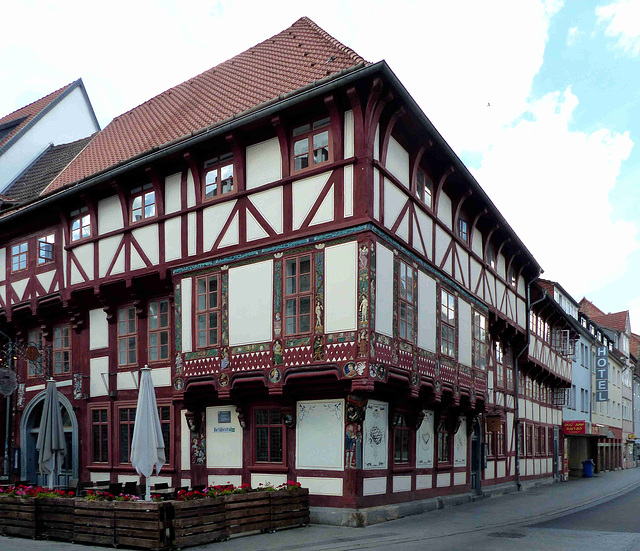Location
Lat, Lng: 51.533677, 9.936702
You can copy the above to your favourite mapping app.
Address: Domino
You can copy the above to your favourite mapping app.
Address: Domino
Keywords
Authorizations, license
-
Visible by: Everyone -
All rights reserved
-
95 visits
Göttingen - Junkerschänke


The origins of Göttingen lay in a village called "Gutingi", first mentioned in a document by Otto I in 953. It is presumed that Henry the Lion, Duke of Saxony and Bavaria, founded the town northwest of this village, between 1150 and 1200. Its inhabitants obeyed welfish ownership and ruling rights, and the first Göttingen burghers are mentioned then, indicating that Göttingen was already organized as a true city. It was not, however, a Free Imperial City ("Reichsstadt"), but subject to the Welf dukes of Brunswick-Lüneburg. The city was initially protected by ramparts, at the end of the 13th century by walls on top of the ramparts. Permission to erect the wall was granted in 1362 by Duke Ernst of Brunswick-Göttingen, and construction ultimately took 200 years.Around 1350, Göttingen joined the Hanseatic League. Göttingen only became a paying member in 1426, and in 1572 it left the Hanseatic League.
The Reformation initially seemed to bypass Göttingen. Even when the Peasants' War raged through Germany in 1524/25, things remained quiet in Göttingen. It was not until 1529, twelve years after Luther posted his theses, that the Reformation began in Göttingen.
Göttingen suffered greatly during the Thirty Years' War, which led to the city's economic and political decline. The number of inhabitants, which was still 6000 in 1400, fell to less than 3000 around 1680. The principality of Brunswick-Calenberg, to which Göttingen had belonged since 1634, was made an electorate by Emperor Leopold I in 1692 under Duke Ernst August. From 1714, the Electors of Brunswick-Lüneburg (Electoral Hanover) were also kings of Great Britain. Ernst August's son, Elector Georg Ludwig of Hanover, was to ascend the British throne as George I.
Until then, the Electorate of Brunswick-Lüneburg had not had its own university. A university was founded in Göttingen to train the theologians, lawyers and doctors needed in the country. During the reign of George II August of Great Britain, who gave the university its name, teaching at the George August University was opened in 1734.
Junkerschänke - erected in 1451 and used as a pub since 1883. There are numerous carvings on the facade. Among other things, there are biblical scenes and signs of the zodiac.
The Reformation initially seemed to bypass Göttingen. Even when the Peasants' War raged through Germany in 1524/25, things remained quiet in Göttingen. It was not until 1529, twelve years after Luther posted his theses, that the Reformation began in Göttingen.
Göttingen suffered greatly during the Thirty Years' War, which led to the city's economic and political decline. The number of inhabitants, which was still 6000 in 1400, fell to less than 3000 around 1680. The principality of Brunswick-Calenberg, to which Göttingen had belonged since 1634, was made an electorate by Emperor Leopold I in 1692 under Duke Ernst August. From 1714, the Electors of Brunswick-Lüneburg (Electoral Hanover) were also kings of Great Britain. Ernst August's son, Elector Georg Ludwig of Hanover, was to ascend the British throne as George I.
Until then, the Electorate of Brunswick-Lüneburg had not had its own university. A university was founded in Göttingen to train the theologians, lawyers and doctors needed in the country. During the reign of George II August of Great Britain, who gave the university its name, teaching at the George August University was opened in 1734.
Junkerschänke - erected in 1451 and used as a pub since 1883. There are numerous carvings on the facade. Among other things, there are biblical scenes and signs of the zodiac.
- Keyboard shortcuts:
Jump to top
RSS feed- Latest comments - Subscribe to the comment feeds of this photo
- ipernity © 2007-2025
- Help & Contact
|
Club news
|
About ipernity
|
History |
ipernity Club & Prices |
Guide of good conduct
Donate | Group guidelines | Privacy policy | Terms of use | Statutes | In memoria -
Facebook
Twitter











Sign-in to write a comment.